During my weekend stay last April with the members of First Presbyterian in Thunder Bay, Ont., this comment by a member captured the essence of this caring church community.
Over the last 20 years, the refugee committee of Edna Irwin, Leslie Shaw and Willa Jones has organized sponsorship for refugees from Vietnam, Cambodia, Eastern Europe, Russia, Burma, Sierra Leone, Somalia and Ethiopia. Their church, under the guidance of past minister Jim Patterson and others, has grown thanks to their ecumenical spirit.
Willa Jones first went to Burma and Thailand in 1990 and made contact with authorities there to see about sponsoring refugees who had fled from many areas of southeast Asia. Shortly afterward, the first refugees sponsored by the congregation arrived in Thunder Bay.
The Karens who came from northwest Burma (Myanmar) were the largest group to arrive. Forced resettlement and state-sponsored violence had resulted in their migration to refugee camps in Thailand. The Karen refugee community in Thunder Bay now numbers over 200, and along with Chin and Arakanese, the total Burmese community consists of almost 300 individuals. As their numbers increased, they were able to establish their own worship service at First, led by Wah Lay Ray, their pastor, who is a settlement worker at the Thunder Bay Multicultural Association. Wah Lay Ray is an extraordinary person. After leaving a refugee camp in Thailand, he has become the Karen community’s spiritual leader.
During my visits with a number of refugee families, I was struck by the tremendous work this church has done not only in facilitating their resettlement but also continually guiding and offering material, emotional and spiritual support.
A number of the refugees obtained homes through Habitat for Humanity and provided sweat equity in the construction. Their gratitude was evident as I was welcomed into their homes, and saw the joy on the faces of their children.
Saw Winning was the first Karen to arrive in Thunder Bay. He was involved in the pro-democracy student movement in 1988 against Burma’s oppressive military regime. The military responded to protests with violence, killing thousands including monks and students. Subsequently, the military junta has crushed all forms of dissent and only recently freed democratically-elected Aung San Suu Kyi from house arrest. She’s the daughter of Aung San, who was the Karen leader after World War II.
The regime’s forced resettlement policies and land confiscation caused Saw and thousands of others to flee Burma. Just as many new refugees have no choice but to take menial jobs, Saw first found work delivering flyers but is now employed at a hotel and is working towards his hotel management diploma from Confederation College.
In some ways, the history of Burma is the history of a people at war with itself. Before the British took control of Burma in the late 19th century, the region contained several small, warring kingdoms. Christianity was brought by British and American Baptist missionaries to Karens and other ethnic groups. After World War II—in which the country was a battleground—the British retreated from Burma without a plan to foster this new commonwealth state; and the Karens have struggled in an attempt to form their own state.
What follows are snapshots of just some of the First-sponsored refugees I met while in Thunder Bay:
Bassie Kargo from Sierra Leone
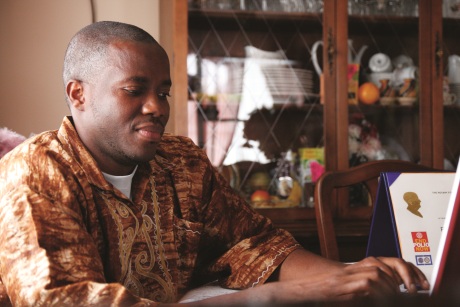
Bassie Kargo fled Sierra Leone for Senegal to avoid being conscripted as a child soldier during the brutal 11 – year civil war in his homeland, and arrived in Canada in 2000. He now has a family with two children, works at the local college, and studies political science at Lakehead University. He has given back by establishing the Friends of Mabureh—a non – governmental organization that raises funds to build schools in rural Sierra Leone for internally displaced persons.

Tawk Cung from Burma
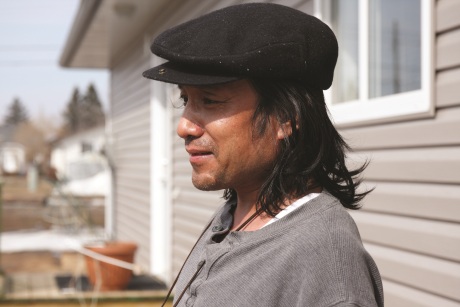
Tawk Cung, a Chin, shown with his son Jeffrey, obtained his physics degree in 1981 in Rangoon. To escape the violence and oppression in Burma, he fled to northeastern India where he taught for 10 years. He has lived in Canada for eight years.
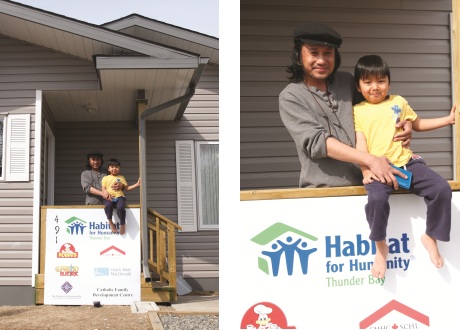
Saw Winning from Burma
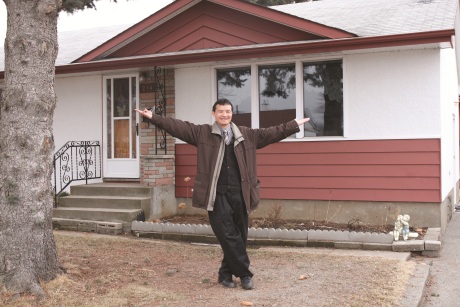
Saw Winning is pictured here with one of his two young children, Pawnay-Theblay. He has been in Thunder Bay for over 15 years. After escaping Burma and finding refuge in Thailand, he came to Northern Ontario and built a new life—starting with delivering flyers and eventually buying a house for his family. As one of the original worship leaders for the Karen community, he has brought his rich culture to this city and has become a vital community member.

Wah Lay Ray
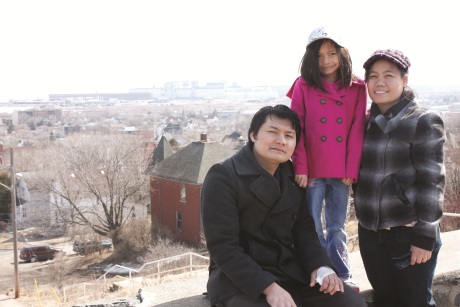
Wah Lay Ray is the current spiritual leader of the Karen community as pastor for the vibrant and uplifting weekly Sunday afternoon service at First Presbyterian. He completed his pastoral studies in a refugee camp in Thailand and then arrived in Thunder Bay; at first he worked at three jobs to make ends meet. Along with his wife, Daisy and daughter, Gloria, he has found not just a welcoming community, but an opportunity to share Jesus’ teachings with his fellow Christians in his native tongue.
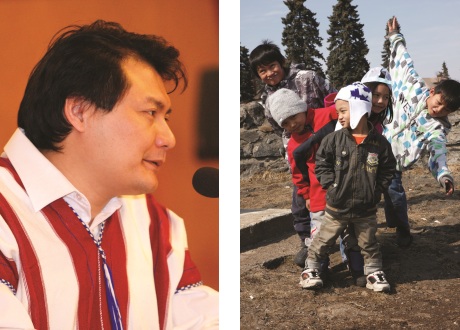
First’s 50th Anniversary supper and talent show
At First’s 50th anniversary supper and talent show, the multicultural displays were impressive. It was evident that this was a community intent on reaching out—not just locally but to far parts of the world with a message: We can help. You are not alone.

